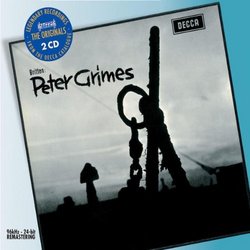| All Artists: Britten, Pears, Brannigan, Watson, Roh Title: Peter Grimes Members Wishing: 0 Total Copies: 0 Label: Decca Original Release Date: 1/1/2006 Re-Release Date: 10/10/2006 Album Type: Original recording remastered Genre: Classical Styles: Opera & Classical Vocal, Historical Periods, Modern, 20th, & 21st Century Number of Discs: 2 SwapaCD Credits: 2 UPC: 028947577133 |
Search - Britten, Pears, Brannigan :: Peter Grimes
 | Britten, Pears, Brannigan Peter Grimes Genre: Classical
|
Larger Image |
CD Details |
CD ReviewsSTILL A CLASSIC AFTER HALF A CENTURY Klingsor Tristan | Suffolk | 10/01/2009 (5 out of 5 stars) "There have been many productions of Grimes around the world and a good few recordings made since this first one was committed to disc nearly half a century ago. From our perspective in the 21st Century it is hard to recall the huge impact made by the first production at Sadlers' Wells in 1946 and by this recording just a decade or so later. It's now easier to see the antecedents and ancestors of the piece - Verdi, Mahler, even Mozart. At the time it seemed a really revolutionary piece, not only for British but also for worldwide opera.
The recording, too, was something new. This was the first time that John Culshaw and his Decca team had fully implemented their ideas for making a real production out of a stereo opera recording. The original booklet proudly showed the grid laid out on the floor that allowed singers to move about the imaginary set as they would in a real theatrical production. And the recorded sound was absolutely state-of-the-art for its time, then still in the early days of stereo. These digital transfers still shine almost as brightly as any of the more modern recordings. The performance itself has rightly become a classic. The composer conducting his own work, of course, has a special authenticity. And more. Britten, unlike many conducting composers, was a highly professional, totally convincing and usually revelatory conductor - of other composers' works as well as his own. So it is here. Working with an opera house chorus and orchestra (Covent Garden), there is still something of the `shock of the new' about this performance. The drama of the interludes - particularly the Passacaglia and the one before the final scene which is not included in the concert set - has enormous impact and, in these two cases, is probably more moving than any. The reprise of the Dawn Interlude at the end of the opera as the villagers return to their work as though nothing has happened, closing over the incident as disinterestedly as the sea closes over Grimes himself, carries true tragic weight. And, with its pp ending, seems to look forward to another seascape at the end of Britten's final opera, Death in Venice. Grimes was, of course, the first of Britten's great operatic gifts to his lover and muse, Peter Pears. The role is written for that specific voice and it sits inimitably within its range and capabilities. Whether it's the dreamy head-tones of the `Great Bear and Pleiades', the motivically vital and dramatic plunge of `God have mercy upon you', the great yearning leap of a ninth on `What harbour shelters peace' or the highs and lows of the mad scene (melodic and emotional), the phrases sit perfectly and naturally in the voice. Pears sings the role as no other tenor could and it remains the yardstick for all future performances. If I have a hesitation, it is over the characterisation of Grimes. Pears just seems a little urbane and sophisticated for this uncouth, unsophisticated, violent outsider (albeit one with dreams). Vickers sits at the opposite pole in a performance Britten was said to have hated: he is a raw brute of a man, aurally on disc as much as physically in the theatre. It is a great performance, too - proof that the role is more than big enough to take radically different interpretations. If you want another great reading that sits somewhere between the two, then Langridge on the Hickox discs is probably your man. As for the rest, this recording was made before all parts in Britten recordings were reserved for the Aldeburgh coterie. Ellen and Balstrode are both taken from Decca's roster of American singers. Both are more than adequate, but probably bettered elsewhere - Heather Harper is arguably the finest Ellen on disc; sadly the best Balstrode in my experience, Norman Bailey, should have been on the first Davis recording but was indisposed at the time. Owen Brannigan (who was a member of the coterie) is probably the finest Swallow on disc. For the rest of the wonderful gallery of Borough villagers, it's a matter of swings and roundabouts between the various recordings. Nevertheless, this remains a classic recording. The touchstone for your choice of recording is probably the singer playing the title role where the choice lies between Pears, Vickers and Langridge. But then again, Haitink on EMI also provides a highly memorable performance, more international and mainstream in outlook, despite a slightly weaker Grimes in Rolfe-Johnson. Ah, decisions, decisions!" |

 Track Listings (26) - Disc #1
Track Listings (26) - Disc #1